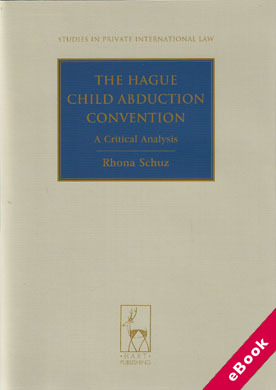We are now closed for the Christmas and New Year period, returning on Monday 5th January 2026. Orders placed during this time will be processed upon our return on 5th January.

The device(s) you use to access the eBook content must be authorized with an Adobe ID before you download the product otherwise it will fail to register correctly.
For further information see https://www.wildy.com/ebook-formats
Once the order is confirmed an automated e-mail will be sent to you to allow you to download the eBook.
All eBooks are supplied firm sale and cannot be returned. If you believe there is a fault with your eBook then contact us on ebooks@wildy.com and we will help in resolving the issue. This does not affect your statutory rights.
International child abduction is one of the most emotionally charged and fascinating areas of family law practice. The 1980 Hague Convention on the Civil Aspects of International Child Abduction was the response of the international community to the increase in the phenomenon of parental child abduction.
However, behind the widely acclaimed success of this Convention - which has been ratified by more than 80 states - lie personal tragedies, academic controversy and diplomatic tensions.
The continuing steady flow of case-law from the various Member-States has resulted in the emergence of different approaches to the interpretation of key concepts in the Convention. In addition, over the years other global and regional legal instruments and the recommendations of the Special Commissions have had an impact on the implementation of the Convention.
This book brings together all these strands and provides an up-to-date, clear and highly readable discussion of the international operation of the Abduction Convention together with in-depth critical academic analysis. Particular emphasis is placed on analyzing the interpretation of the Convention in the light of the 1989 UN Convention on the Rights of the Child. Throughout the book, examples are brought from case-law in many jurisdictions and reference is made to relevant legal and social science literature and empirical research.
Over the past decade, increasing focus has been placed on what are effectively procedural issues, such as separate representation for children, undertakings, judicial liaison and mediation. The book analyses the significance of these developments and the extent to which they can help resolve the continuing tension between the objectives of the Convention and the interests of individual children.
This book will be essential reading for judges, practitioners, researchers, students, policy-makers and others who are seeking a critical and informed analysis of the latest developments in international abduction law and practice.